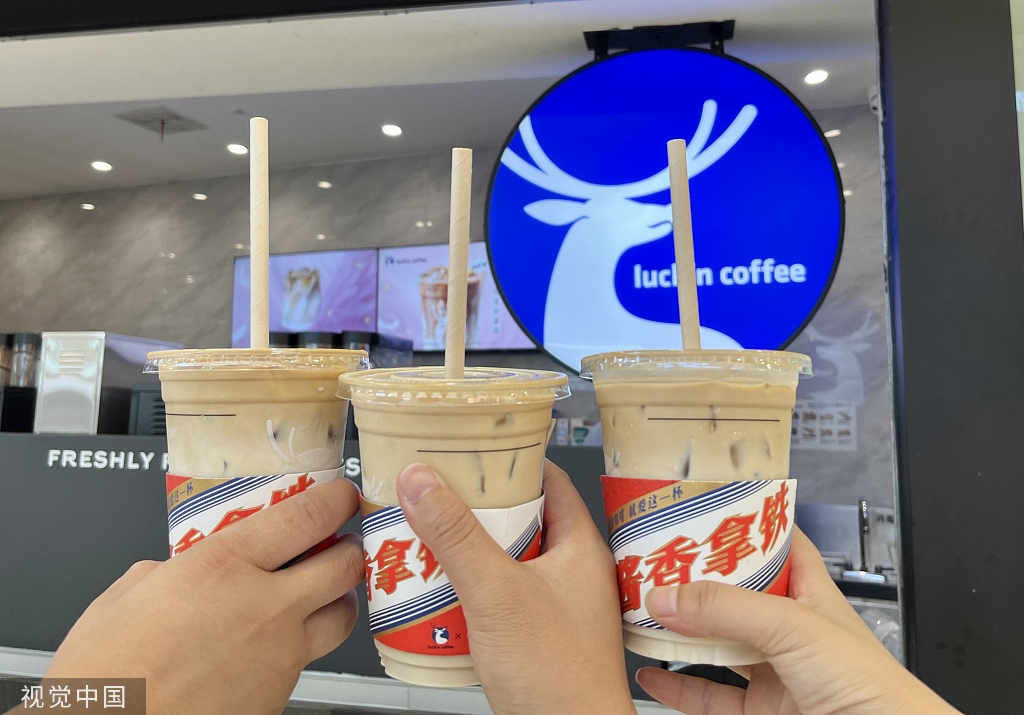
Luckin Coffee teams up with Kweichow Moutai making an iconic flavored coffee. [Photo/VCG]
Festivals can be a headache for many Chinese. Peak seasons for celebrations and ceremonies, holidays also often mean, as per tradition, giving out money to relatives and friends. Even for long-lost schoolmates one hasn't contacted, or (联系 lián xì) in Chinese, for years, gifts have to be handed over at, say, a wedding. After all, humans are social animals, and such human 联结 (lián jié, connections) have bound people together in China for millennia.
The Chinese character 联 (lián) first appeared in oracle bone script over 3,000 years ago. Comprised of an 耳 (ěr, ear) radical on the left and a 糸 (sī, silk) on the right, it symbolized tying something through a person's ear, which scholars believe conveyed the meaning of "linking" or "joining." Its current form emerged during the Qing dynasty (1616 – 1911), with the right part simplified as 关 (guān) in some texts, though its meaning has remained basically unchanged throughout history.
In Unofficial Gleanings of the Wanli Era( 《万历野获编》 wàn lì yě huò biān), a Ming dynasty (1368 – 1644) encyclopedia, scholar Shen Defu (沈德符, shěn dé fú) described people from Beijing going to the city's suburbs to "travel hand in hand, and prepare food and drinks on the ground (联袂嬉游,席地布饮 lián mèi xī yóu, xí dì bù yǐn)."
Today, the phrase 联袂 (lián mèi, literally "join sleeves") is mainly used in literary texts, while 联手 (lián shǒu, join hands) is more commonly used to express the idea of "going hand in hand," as seen in expressions like 强强联手 (qiáng qiáng lián shǒu), meaning mutually beneficial cooperation.
The character's meaning has since evolved to encompass various connections, close and far, physical and emotional. For instance, 联姻 (lián yīn) signifies a connection through marriage, while 联盟 (lián méng) denotes an alliance. Just as 联姻 has been a means for rich and powerful families to enhance their wealth and status, businesses have shown a keen interest in 联名 (lián míng), or co-branding, over the past few decades. This September, a collaborative product called "Fragrant Sauce Latte (酱香拿铁 jiàng xiāng ná tiě)," launched by Kweichow Moutai, one of China's best-known baijiu liquor producers, and coffee chain Luckin Coffee, sold over 5.4 million cups nationwide, generating revenue of 100 million yuan within one day.

[Photo/The World of Chinese]
联络 (lián luò) is to "contact" via phone or other means, and 联络感情 (lián luò gǎn qíng) is to get in touch with the sole intention of building relationships. Many organizations have their own liaison department (联络部 liánluòbù), liaison office (联络处 lián luò chù), or liaison person (联络员 lián luò yuán). When an individual cannot be contacted, they are described as 失联 (shī lián).
Nowadays, the internet (互联网 hù lián wǎng) and other technologies have transformed the world into a "global village." A message sent from Shanghai can be received within seconds by people in New York. With the help of social media, even public figures and celebrities are no longer distant—for better or worse. Popstars, journalists, and world leaders are all on Weibo or X, formerly known as Twitter, though their opinions and rants may not have made it easier for the United Nations (联合国 Lián hé guó) to achieve world peace.
Just as geopolitical alliances require partnerships to advance, Chinese rhyming couplets, or 对联 (duì lián), are only complete in pairs. People often paste these rhymes on either side of their door during the Lunar New Year, or other traditional occasions, with the messages commonly inviting good luck and prosperity for the family.
Another Lunar New Year tradition in China is to gather together, or 联欢 (lián huān), with family and friends to celebrate. CCTV's Spring Festival Gala, which it has broadcast every Lunar New Year's Eve since 1983, even includes this term for "get-together" in its full name: 春节联欢晚会 (Chūn jié Lián huān Wǎn huì).
The Lunar New Year is a time of eating, celebrating, and, yes, money-giving. How else would people maintain their 社会关系 (social ties, shè huì guān xi)?
Source: The World of Chinese
Editor: wanwan